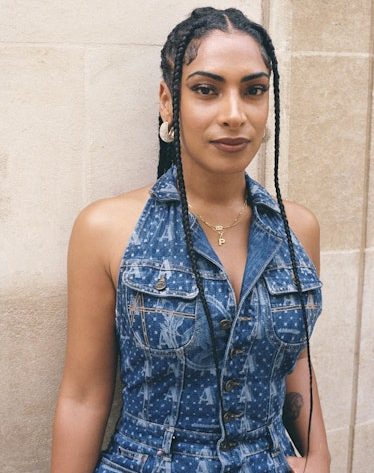In 2017, Priya Ahluwalia took a trip to visit her father in Lagos, Nigeria. While driving around the city, she noticed that a number of street vendors were wearing what she describes as “very obscure secondhand clothing.” Curious to know how they’d gotten their hands on London Marathon T-shirts and streetwear pieces with distinctly British graphics, she rolled down the window and started asking questions.
It was through those conversations that Ahluwalia, who was then completing her master’s in menswear at London’s University of Westminster, came to learn about Panipat, a city in northern India where clothing and textiles discarded by Westerners were being sent, to be dumped, recycled, or sold in places like Lagos. Ahluwalia’s mother is of Indian descent, so Ahluwalia decided to visit the country herself, taking her camera to document the mountains of fabric waste; she eventually compiled all of her photos into an eye-opening book titled Sweet Lassi. “Those trips made me think about the intersection of heritage and sustainability, and what sustainability means for the places that I hail from,” she says.
The designer Priya Ahluwalia in a jumpsuit from her spring/summer 2023 collection.
The experience also inspired Ahluwalia’s Westminster graduate collection. Shown in 2018 and made almost entirely out of repurposed fabrics, it quickly got the attention of press and retailers, and ultimately served as the foundation for the designer’s namesake brand. Big labels were starting to get hip to sustainability, and what Ahluwalia was doing felt both forward-thinking and authentic. Opening Ceremony and LN-CC placed orders before she even had a logo. “When I look back at that now, it was a massively big achievement,” she says. “I was like, Okay, they want me to make these clothes. I’m going to figure out how to do it, and I’m going to hit the ground running.”
The following year, Ahluwalia won the H&M Design Award, which came with an endowment of 50,000 euros that helped her get her business off the ground. Covid hit soon after, but even during the pandemic, Ahluwalia managed to stay busy: Gucci invited her to make her first film, Joy, as part of GucciFest in 2020. That experience exposed her to new ways of expressing herself creatively. “It was honestly a life-changing moment,” she says. “It was a two-day shoot, and I was trying not to cry the whole time.”
Since then, Ahluwalia, who is now 30, has made multiple films for her own brand and others, and is now involved with Ridley Scott’s creative production company, Black Dog Films. She has also directed music videos, and the films she’s made for London’s Design Museum will come out this fall. “I started as a designer, and I love clothes,” she says. “But I’ve realized that I really do see the world of Ahluwalia in lots of different spaces. I can visualize what an Ahluwalia room or car interior would look like.”
Ahluwalia got her start in menswear because she saw it as a category that had lots of room for experimentation, but she expanded into womenswear after a collaboration with Ganni in 2021. (She has also started making shoes.) Her womenswear, of course, shares the same DNA as her menswear, with zippy prints on sharply tailored matching sets. In addition to exuberant sweats that would make any work-from-home wardrobe brighter, there are clothes you’d want to wear to the club (an electric blue minidress) or to a wedding (a hot pink gown with red ruffle trim). “What is important to me is that my collections mean something, that they’re intentional,” she says.
Her multidisciplinary interests are reflected in the research-first approach she takes to designing. For example, her fall/winter 2023 collection, titled “Symphony,” was inspired mainly by the 1980s and early ’90s pop superstar Sade. “I was looking at her style but also at graphics from her album covers,” Ahluwalia says. “I took the sound waves of her songs and incorporated them into prints. Everything is there for a reason.” The result of this process is clothes that feel deeply personal—they’ve got a scrappy London edge, a dignified sense of heritage, and a youthful, casual cool all at once.
“We’ve done quite a lot in the past five years, and now it’s about solidifying those areas,” Ahluwalia says of what’s ahead. One challenge has been growing the business while staying true to its values, particularly when it comes to sustainability. “In the beginning, around 80 percent of the collection was made from vintage. And now, as we’re scaling, it’s harder to do that because of sourcing.” She and her team are “working really hard behind the scenes” to intercept as much deadstock as they can before it ends up in places like Panipat.
Spring/summer 2024 will be a “celebration of unsung heroes of art and culture,” Ahluwalia says, inspired in part by the Cuban American artist Ana Mendieta, who was known for her work combining natural landscapes and the female body. That’s all she can say for now—which brings us, finally, to a perennial challenge for any creative person these days: finding the time to actually create. “Sometimes, the amount of Zooms and calls I have to do makes me want to cry,” Ahluwalia says, putting her head in her hands. “Like, when am I going to do the actual work?” With that, I let her get back to the cutting room.
Hair by Sarah Jo Palmer for Oribe at MA World Group; Makeup by Lucy Burt for Dior Beauty at The Wall Group; Models: Troy Fearn, Harry Fisher, Nell Kalonji, Mata Mariélle, Melat Matusala; Photo Assistant: Sasha Simpson Vanner; Fashion Assistant: Patience Boateng; Hair Assistants: Charles Stanley, Aimeric Amiot; Makeup Assistant: Tina Khatri; Tailor: Nafisa Tosh.



